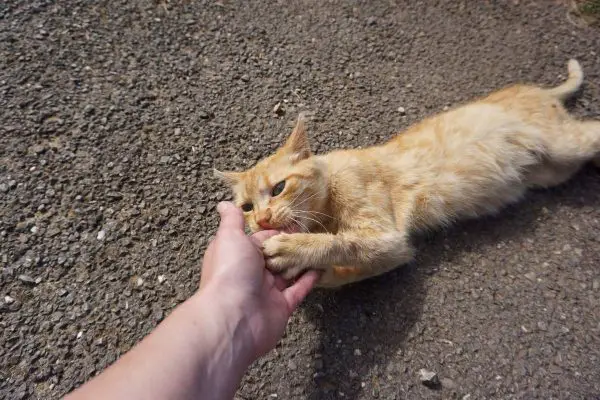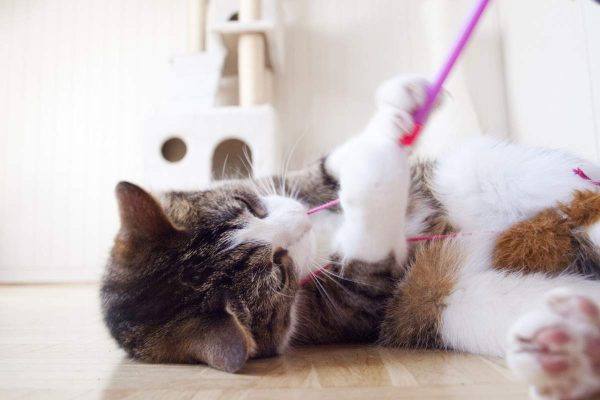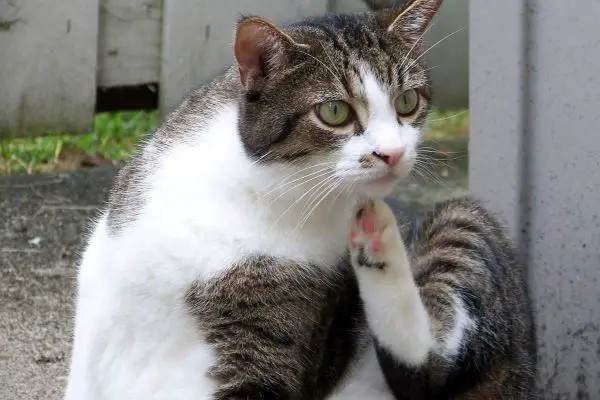If you’ve owned both cats and dogs, you may think that when your pet rolls over and offers you their tummy, they want you to pet them there. With dogs, this is often the case, as canines enjoy a good belly rub or chest scratch. However, with cats, reaching out to pet their belly will sometimes result in you being bitten or scratched.
So, why does my cat bite me when I pet her belly? Cats, unlike dogs, offer their bellies as a sign of trust, not submission. Reaching out to pet your cat’s belly may feel scary to them, and so they ward you off with a bite to enforce their personal boundaries.
It can be difficult to decipher what your cat’s inclination to lash out means—whether it’s out of some form of distress, or habit, or for another reason. As you read on, you can learn more about cat behavior, and other explanations for their biting or scratching you when you’re just trying to stroke their belly. It isn’t always as simple as instinct!
Cats and Instinct

You may already be aware of the fact that cats aren’t nearly as domesticated as dogs. Cats are often self-sufficient, and mostly capable of taking care of themselves in the wild, with the exception of certain breeds that have distinctive, human-bred features, like Persians or the Ragdoll.
Because of the fact that cats still possess many ‘wild’ traits, many of them are still very instinct-driven. You may have seen your cat freeze and ‘chirp’ at a bird outside the window, even though it has just eaten a bowl of food and doesn’t need to hunt. This behavior is instinct at work. Humans have never bred it out of cats fully, because a good hunting cat was a valuable commodity long ago.
Because cats still possess much of their instinctive behavior, they will still defend themselves from perceived attacks—and this includes you. You have probably accidentally surprised your cat with a touch or a stroke before, and received a scratch for your trouble.
This doesn’t mean your cat hates you. It means that your cat was surprised, thought it was being attacked, and defended itself. Understanding what your cat is thinking when it scratches or bites is an important part of knowing how to avoid being hurt.
Understanding Your Cat

Knowing that your cat is still operating under some ‘wild’ instincts may make it easier to understand your cat’s reluctance to have its belly touched. If your cat presents its stomach to you on its own, your cat is demonstrating that it trusts you a lot.
Cats, just like us, contain their vital organs in their stomach and under their ribs. They’re aware that showing their belly to a threatening figure like a predator or another cat could be very dangerous, as they could get seriously hurt.
However, when your cat rolls over and shows you their belly, it’s because they hope that you aren’t going to hurt them, and they want to show you that they trust you. Your cat rolling over is essentially a message that says “I really like you and trust you, please don’t violate that trust.” You should feel happy that your cat feels so safe with you!
Lost in Translation
However, despite your cat’s intention, we often only see a soft cat belly, and we immediately want to give it a gentle stroke. To us, petting our cat is a demonstration that we love our pet, and value their presence.
To us, when our cat offers their belly, they are asking for a stroke. This is often not the case—they are offering us their trust. In the end, it’s a simple miscommunication that is easily resolved.
When your cat rolls over gently and shows you their belly, no matter how tempting it might be, don’t touch them! They are probably just wanting to show you their trust, and you reaching out to pet them makes them feel anxious that their trust in you is misplaced and you might hurt them.
How to Fix It
It’s difficult to fix a problem that is linked to instinct. It isn’t a habit that can be broken because it is an essential part of your cat. However, you can consistently prove to your cat that you aren’t a threat. You can demonstrate to your cat that you’re trustworthy by restraining yourself and not reaching out immediately.
Instead, try, speaking gently to your cat instead of petting them. By showing that you are respecting your cat’s trust in you, you’re making them feel much safer. With time, you may be able to reach out and stroke your cats head, and then, with more time, their chest.
With a great deal of patience, you may be able to pet your cat’s belly when it’s offered, but this may not work. It is likely best to allow your cat to set and demonstrate certain boundaries regarding themselves.
Other Reasons for Scratches

Your cat showing their belly is not always a sign of trust. Depending on the surrounding circumstances, it may be a last-ditch defensive posture. When cats fight, one of them may actually turn onto their back—and this is definitely not a sign of submission or trust!
Instead, this is your cat bringing all their available weapons into the fight: their front claws, their back claws, and their teeth. Cats may also do this while playing in a mimicry of hunting or fighting. You may see your cat roll over and start batting at their favorite toy with all four of their feet, grabbing it and chewing on it before tossing it again.
This is the same defensive reflex at work while your cat is imagining their toy is some wild animal that they’re fighting with. Regardless, if you see your cat flip onto their back in an angry or defensive way, or while they’re actively playing with you, it’s best to keep your hands clear of them, because they’re ready to play or fight, and reaching in toward their belly may result in a serious bite or scratch.
Sensitivity and Triggers
If your cat is not defensive and will occasionally allow you to pet their belly once or twice before scratching or biting you, it may be that your cat just has a very sensitive belly.
Since cats stalk their prey low to the ground, they rely on the nerve endings in their skin on their stomach to tell them more about the sort of terrain or environment they are moving through, and it’s possible that they can even sense vibrations from their prey, or from other approaching animals.
Because of this increased sensitivity, having you touch their stomach may be uncomfortable for your cat, and so they tell you to stop by biting or scratching you.
Other Reasons for Biting When Touched
If your cat seems to enjoy being stroked one minute, then seems to ‘flip a switch’ and attack the next, your cat may be a ‘love-biter’ or demonstrating petting-induced aggression. Unfortunately, this behavior is not particularly well-understood, so there isn’t a clear reason behind it, but on the brighter side, it doesn’t spell the end of you being able to pet your cat.
It just means that your cat is more sensitive than others. To help your cat and yourself to avoid conflict and unnecessary bite-marks, be sure to watch your cat for any signs of changing mood, such as dilating or contracting pupils or a twitching tail.
Once you’ve learned what your cats indicators for becoming aggressive are, you’ll know when to stop petting and take a step back. Consulting your vet or a cat behavior specialist may also help you learn more about the small signs that your cat may be becoming aggressive.
Conclusion
Your cat presenting its belly to you may seem like an invitation to reach out and stroke your cat, but if it’s obvious that your cat is not comfortable with that—biting or scratching at your hand—then it’s best to keep your hands to yourself. If you genuinely want to be able to pet your cat’s belly, you can try to desensitize your cat over time.
However, this is not always possible because of your cat’s instincts ruling over their behavior. Because of this, and their natural sensitivity to touch on their stomach, your cat may never be wholly comfortable with you touching their belly.
On the other hand, if your cat is consistently aggressive toward your touch, regardless of where you’re touching them, studying signs of your cat becoming agitated or anxious may help you avoid unnecessary injury.
Overall, it’s best to remember that your cat is an animal, and that its instincts are ultimately a part of its nature. Learning more about what your cat likes and dislikes is important, because it leads to being a good owner, and companion, for your cat. The more you understand your cat, the more your cat will understand you, and the happier it will be.

